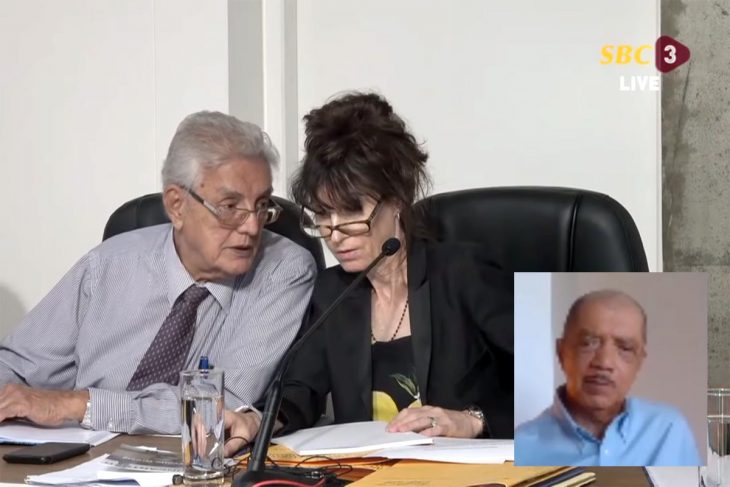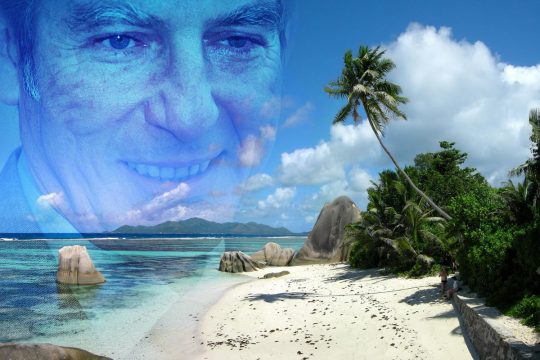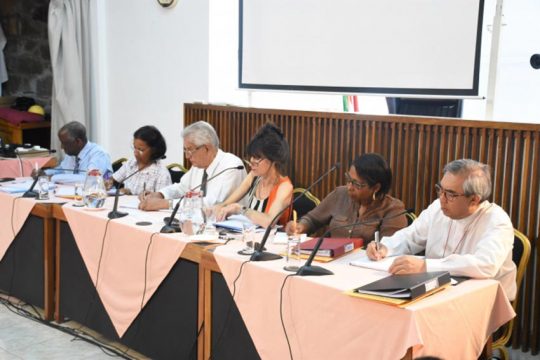“I am not afraid of the truth and I have nothing to hide despite the lies and rumours to the contrary on social media,” James Michel said, on November 5, before the Truth, Reconciliation and National Unity Commission (TRNUC). The testimony of the former president of the Seychelles islands was much anticipated as he had been a key actor in the June 5, 1977 coup d’état.
Set up in May 2019, the seven-member truth commission is listening to complaints on human rights violations in the island nation following that coup, led by the then Prime Minister France-Albert René against President James Mancham. René, who died in February this year, established a one-party state and was the president between 1977 and 2004. Michel replaced him from 2004 to 2016. Multi-party democracy was re-instituted in 1993. The commission’s mandate is to shed lights on events leading up to the coup and its aftermath until the return to a multi-party system. Its sessions are held over a ten-day period, every month, since September, and are broadcast live on national TV and streamed online.
“It was necessary to bring radical change”
For his first appearance before the TRNUC, James Michel’s testimony focused on his role on the day of the coup. He testified via video link from Abu Dhabi, where he presently resides. In a statement read prior to answering questions from the commissioners, Michel said he has decided to come forward on his own free will, has not been coerced to appear before the commission, and has no hidden agenda. He said he wanted to clear his name. He also explained that he had opted for the teleconference as he did not wish to delay the commission’s proceedings.
On the outset, he invited anyone who wanted to know his full account of the coup d’état to read his book ‘Distant Horizons’, published in 2010. Defending the coup, he said that following the country’s independence from Britain in 1976 nothing much was changing in Seychelles. “I think it was necessary to carry out an action that would bring a radical change which has brought many benefits including social justice for all. It is as a result of the coup that today hundreds of Seychellois are property owners and have their own homes. The majority of properties was owned by around fifty big families. We have equality in opportunities for all, access to education and health for all. It is because of the coup that a class system was banned.”, said the former president. “At the time, when you look at things in context, it was necessary to have that radical change. President René insisted that it should be done without bloodshed. The overall objective was to have a fair society for all and today I still believe in social justice.”
The plot
Michel would hold various top positions in the government and the ruling party. He confirmed that his main role on June 5 was to relay information from René – who was the leader of the coup – to the two groups involved in operations. “I was in charge of communications and I had only a walkie-talkie to do this. I didn’t have any guns. The guns that are seen in my possession in some photos taken on that day, were from police armoury that were seized on the day”, said Michel.
He said that René ensured that only a handful of people had knowledge of the coup and its execution date. Some men who took part in it found out about it on the day itself, hours before they stormed the police armoury. “René was an expert strategist, a strong and powerful leader who ensured that each member of the team knew only what they needed to know and at the appropriate time as well. When the time arrived for the coup, we were all brought together for the execution of the plan.”
The commission enquired about military training done prior to the coup. “I believe there were a few, maybe four people, who received military training in Tanzania. In my case I was shown how to assemble and disassemble a gun during a trip to Tanzania. I was there for a conference and one of our freedom fighters showed me how to handle a gun. But no bullets were used on that day. I also explained in my book that exercises were done locally where the targets were rabbits”, said Michel.
Details on deaths on June 5, 1977
But it was especially about the deaths of several individuals who were killed during the coup and under the one-party system – including Hassan Ali (a prominent businessman, disappeared in August 1977), Simon Desnousse (tortured and murdered in October 1982), Gilbert Morgan (disappeared in February 1977), Sonny Elizabeth and Michael Hoffman (murdered in July 1983) – that the former president’s testimony was eagerly expected.
Nothing new was disclosed. Michel denied having any involvement in any of the deaths. “I wouldn’t know about these deaths because at the time I was not the minister in charge of internal affairs or the police. From what I heard the deaths and disappearances were investigated by the police. But I don’t know what happened to these men”, said Michel.
He was more forthcoming about two other deaths on the day of the coup – that of Berard Jeannie, who was on duty at the armoury and refused to hand over the keys, and Francis Rachel, a member of the coup. “I knew Jeannie personally as his family lived next to mine at Anse a la Mouche. Since at the time I was also in the army, I was the one who recruited Francis Rachel because I knew him personally. My role in the army was Political Education Officer. Their untimely deaths pain me to this day. It was tragic and regrettable”. He continued: “On the day itself I was told to wait next to the Mont Fleuri cemetery to await communication from René, who was our leader, before we could launch the attack and take over the armoury. That was early morning. He was stationed at Val Riche Sans Soucis. And then we heard gunshots being fired and I learned later that Jeannie, a police officer at the Mont Fleuri police station who was guarding the armoury, was shot dead. But I do not know who shot him and I didn’t see who shot him. For Francis Rachel I heard it was a ricochet bullet that killed him.”
The case of Davidson Chang Him
However, Michel maintained the coup was justifiable and the majority of people benefited. “Only a minority felt aggrieved,” he said. “René told us that the coup should be bloodless but unfortunately three people died on that day.” The third person was Davidson ‘Son’ Chang Him.
Last August, James Michel had been invited before the TRNUC to shed light on the fatal shooting of the Democratic Party activist. The former president had declined the initial offer, stating he did not witness the shooting at the Central Police station in the afternoon of June 5. “In the afternoon I was given a gun and ordered to patrol and secure the port and airport, as well as to patrol the south region of the main island Mahe. So I was not at the police station when he was shot. It was later that I learned of the fatal shooting but I was not part of it,” said Michel.
It was through other testimonies that after 42 years of speculations and rumours, family and friends of Davidson Chang Him could now have an idea of what transpired on June 5, 1977, that led to the murder of the 44-year old.
Davidson Chang Him’s case, filed by his children, was the first to be heard by the TRNUC, on its first hearing on September 9. Chang Him, a jeweller by profession, was a vocal Democratic Party supporter. He was shot dead at the Central Police station in the country’s capital Victoria, hours after armed men had taken over the country.
Shot in the back at the police station
The first witness to take the stand was former Minister of Economic Planning and Foreign Affairs under the administration of René, Dr Maxime Ferrari. Ferrari told the TRNUC that he was at the Central Police Station with René on June 5, 1977, but that he did not witness the shooting which occurred sometimes around 4pm. “I heard a gunshot and somebody outside the room I was in shouted that D’Offay [Phillipe D’Offay, the alleged killer of Chang Him] has shot Son Chang Him. But I couldn’t identify the voice to this day”, recounted Ferrari. “I went outside into the yard, where Chang Him’s body was lying on the ground and he was puffing his last breath. He was bleeding and foaming at the mouth and he was all, for practical purposes, nearly dead.”
Ferrari expressed remorse for his role in the coup. He said it took 22 years before he would “tell my truth, the truth that I knew, about the events that occurred in 1977”, through an autobiography, published in 1999 and entitled 'Sunshine and Shadows, A Personal Story'. An extract of the book was read before the TRNUC. It read: “Chang Him was shot in the chest fatally by Philippe D’Offay - one of the armed men. Many people said he was shot in cold blood. I was told by Mr René that it was in self-defence. He was however not armed while D’Offay had a gun.”
Ferrari’s account was corroborated by Guy Roucou, a sergeant within the Special Forces division of the Seychelles Police Force at the time of the coup. Now a retired officer after 47 years in the police force, Roucou was the first eye witness to come forward. He gave damning evidence, confirming that Philippe D’Offay – one of the coup perpetrators who had gathered at the Central Police Station – shot Chang Him at close range.
No self-defense
Earlier in the day, Roucou was among four men, including D’Offay, who had gone looking for Chang Him. “On that drive I heard D’Offay saying to the person sitting next to him that “If I see ‘Son’ today, what I will do to him!”,” Roucou testified. Chang Him’s whereabouts were unknown at that moment. In the afternoon, at around 4.30, Chang-Him turned up at the police station and enquired as to why they were looking for him. “Phillip D’Offay went in front of me in the corridor to the veranda where the cells are located and instructed ‘Son’ to put his hands up, which he did. ‘Son’ was unarmed, and I thought he was going to place him in a holding cell but suddenly, out of the blue, I saw D’Offay taking out his gun – an AK47 – and pointed it at ‘Son’ and pulled the trigger. The bullet hit ‘Son’ in the back. He tried to run but fell in the compound, next to a slip used for vehicle repair. The bullet exited his body and hit Ferrari’s car, which was also parked in the compound”, recalled Roucou. “When ‘Son’ fell, the commissioner of police, Pillay, Mr René and Dr Ferrari all came down to see what has happened. And I remember Mr René saying to D’Offay: “La ki (l***)oun fer ankor!” – what kind of mess have you done now? I went to stand next to ‘Son’. He was still breathing but there was a white foam coming out of his mouth and his eyes rolled back in his head. I remember Dr Ferrari checked his pulse and said to take him to the hospital quickly but doubted if he would make it there in time. He was put in a police land rover and rushed there but I learned later that he died on the way.”
Roucou denied that the shooting was in self-defence. He told the commission the shooting was intentional as Chang Him had already surrendered and had his hands up at the time he was shot. Roucou also informed the TRNUC that the incident was recorded in the Police occurrence book by another officer who wrote: “Phillip D’Offay shot Son Chang-Him in the back in cold blood.”
The official version given to the family
However the commission said this information could not be verified as the occurrence book is yet to be located.
Family members, including the children of the late Chang Him also gave their accounts of events that led to the death of their father and brother. Most of them opted to testify in closed sessions because of the emotional impact of the events on them. But Chang Him’s brother, Bishop French Chang Him, who identified his brother’s body at the city morgue on that fateful day, gave a public account of the event. He said that on that day he spoke to president René who informed him that “Davidson was resisting arrest and was shot by accident”.
The TRNUC is expected to hear other testimonies on the killing of Chang Him. It also plans to call James Michel at a later date to answer questions about security and intelligence in the country, following many complaints of abuse by the military.
Over hundred cases of murder, torture, disappearance and unlawful acquisition of properties, before and after the coup, have been filed before the TRNUC. The commission’s chairwoman, Australian lawyer Gabrielle McIntyre, says its “overriding objective is to unite the people of Seychelles and ensure such violations do not recur.”







